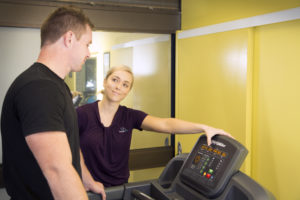Exercise Physiology
Accredited Exercise Physiologists (AEPs) are allied health practitioners and health & fitness professionals. They are educators and coaches in all things lifestyle and physical activity and use exercise as medicine to help treat and manage numerous conditions.
Exercise physiologists prescribe the best exercises for your goals and show you how to perform them safely. They explain the best parameters to use to get the most out of your program and monitor changes to ensure effectiveness. They can also help you become aware of small changes in your lifestyle that can have a big impact on your pain or performance.
What does an Accredited Exercise Physiologist treat?
As well as prescribing exercise as medicine, exercise physiologists also have training in nutrition, psychology and anatomy. This allows them to assess and treat a range of conditions, including:
What are metabolic conditions?
The term "metabolism" describes the numerous different chemical reactions that take place in the body to maintain life and regular functioning. Conditions known as metabolic diseases can impair any component of metabolism. As a result, some individuals could create an unhealthy amount or too little of a substance. These can include but not limited to:- Diabetes (Type 1, Type 2, Gestational)
- Obesity
- Hypercholesterolemia
- Metabolic Syndrome
- Hemochromatosis
How can an Exercise Physiologist help?
For the prevention and management of metabolic disorders, sustainable lifestyle changes backed by targeted exercise are crucial. An exercise physiologist will assess your condition and prescribe a safe and effective exercise program suited towards your needs and goals. Benefits for metabolic conditions can include but not limited to:- Weight loss
- Metabolic health efficiency
- Management of insulin and blood glucose levels
What are neurological conditions?
A neurological condition is a nervous system disorder that affects the central and peripheral nervous system. You can develop one of the numerous different kinds of neurological illnesses throughout time. Some of them will be based on genetics, while others will be influenced by the environment. Some common neurological conditions include:- Parkinson’s Disease
- Dementia
- Epilepsy
- Stroke
- Multiple Sclerosis
- Spinal cord injury
How can an Exercise Physiologist help?
Recent studies have shown a strong correlation between physical activity and the avoidance or postponement of neuro-degenerative symptoms, which include a decline in motor function and mental capacity in individuals with crippling neuro-diseases like MS and Alzheimer's. An exercise physiologist will assess your condition and prescribe a safe and effective exercise program suited towards your needs and goals.What are musculoskeletal conditions?
Injuries or pain in the human musculoskeletal system, which includes the joints, ligaments, muscles, nerves, tendons, and structures that support the neck and back, are referred to as musculoskeletal conditions. An Exercise Physiologist can treat acute injuries/pain however our focus is on the long-term management and chronic conditions of the musculoskeletal system. Therefore, we can treat conditions such as:- Types of Arthritis; including osteoarthritis and rheumatoid arthritis
- Pain within the body
- Fibromyalgia
- A range of inflammatory conditions affecting the bones, muscles, and joints
- Tendinopathies
- Pre- or post- operative
How can an Exercise Physiologist help?
Exercise has many benefits for musculoskeletal conditions including:- Aid joint lubrication and nourishment
- Ease your joint pain and stiffness
- Improve flexibility
- Build muscular strength
- Improve your balance – reduce risk of falls
- Improve posture
- Improve or maintain the density of your bones
- Improve overall health and fitness
What are Mental Health conditions?
Emotional, psychological, and social well-being are all parts of mental health. It affects behaviour, perception, and cognition. It also affects how individuals cope with stress, interact with others, and make decisions. Subjective well-being, perceived self-efficacy, autonomy, competence, generational reliance, and self-actualization of one's intellectual and emotional potential are only a few examples of what is considered to be mental health. Mental Health conditions may include:- Major depressive disorder
- Anxiety
- Post-traumatic stress disorder
- Bipolar disorder
- Obsessive compulsive disorder
How can an Exercise Physiologist help?
Exercise and physical activity have the ability to increase our feel-good hormones that are responsible for our emotions and mood. Therefore, also has to ability to:- Improve mood
- Improve sleep
- Management of anxiety and depression
- Relieve stress
- Improve Memory
What are Functional Capacity Evaluations?
A functional capacity evaluation (FCE) assesses a person's ability to carry out tasks associated with their employment involvement. The FCE process evaluates an applicant's physical condition, bodily functions, and structural make-up in relation to the demands of the position and the workplace. A person's ability to participate in work is, in essence, the main goal of an FCE, while other instrumental daily tasks that assist job performance may also be examined. A functional capacity assessment, a physical capacity assessment or evaluation, or a work capacity assessment or evaluation are other names for similar sorts of testing. A well-designed FCE should include a series of standardised tests that provide outcomes for performance-based measures and show predictive value about an individual's return to work.Who Can Benefit From an FCE?
- Someone who has been injured on the job to determine his or her ability to return to the job or alternate work
- Someone applying for new work
- Someone seeking to return to work or volunteer activities after an injury or illness
- Heart Attack
- Stroke
- Heart Failure
- Arrhythmias
- Heart Valve Complications
Why choose Exercise Physiology:
To maximize the safety of exercise, an Exercise Physiologists categories potential risks and prescribe appropriate exercise intensity and monitor symptoms. An Exercise Physiologist can empower individuals to resume activities of daily living, go back to work, restore, and improve physical capacity, and rebuild confidence to incorporate exercise into exercise participants daily routine.Why choose Exercise Physiology?
- Exercise has been demonstrated to lessen the adverse effects caused by some cancer treatments.
- Exercise physiology may assist in managing tiredness, regaining strength and endurance, maintaining, or improving bone density, controlling weight, and improving balance.
- It is crucial to be as active as possible during and after treatment.
- The goal of targeted exercise interventions provided by an Exercise Physiologist is to provide the maximum benefit of exercise both in the short and long term, with little risk of damage.
Why choose Exercise Physiology?
- Aid with body weight management and weight loss
- Blood pressure management
- Lowering the chance of developing diabetes
- Glucose management
- Enhancing bone density
- Increased muscular strength, and physical function.
- Lowering stress and depression
- Increasing muscular function
- Lower the chance of falls
What type of exercise is the best?
Exercises for adults with renal illness should include a mix of aerobic (endurance), resistance (strength), and flexibility (stretching) activities (Exercise is Medicine Australia, 2014). It is advised to set a goal of 30 minutes each day, five to seven days per week (Exercise is Medicine Australia, 2014).- Pulmonary hypertension
- Lung Cancer
- Asthma
- COPD
Why choose Exercise Physiology?
- Increased exercise capacity
- Increased health-related quality of life
- Reduced breathlessness
- Improved universal muscle strength
- Improved balance
- Improved mood and self-confidence
- Reduced hospitalizations for exacerbation
Always consult your doctor before beginning or increasing exercise. If you have a medical problem that is underlying, this is very crucial. When there is a lot of pollution, avoid exercising outside. For the same reasons that everyone else should exercise regularly, people with pulmonary conditions should do the same. Increased exercise can increase the ease of activities of daily living, your heart and lungs become remain stronger, and you experience improved physical and mental health. However, it might be frightening to consider increasing your physical activity if you currently have shortness of breath. It is essential to work with an exercise physiologist to make an exercise prescription plan that is suitable for you
Every sport has a very varied levels of physical strain imposed on the body. While some sports, like golf, need a high degree of core strength and control as well as back and hip mobility to guarantee a strong and correct swing, certain sports, like long distance running, require a high level of fitness, muscle strength, and endurance. Athletes will adhere to an individualized exercise program that includes strength and conditioning, injury prevention, and sport-specific workouts that consider the demands of the sport on the body to guarantee top performance. An exercise physiologist might be able to assist in this situation. Exercise physiologists study how the body reacts to physical activity and how various organs, including the heart, lungs, and muscles, adjust to repeated physical activity and specialize in prescribing exercise to enhance athletic performance, general health and fitness, recovery from injuries or chronic conditions, and injury prevention. They are experts in movement analysis and creating personalized training regimens to help people reach their fitness objectives.
Assisting people in doing their best in their sport. The exercise physiologists will conduct a thorough evaluation whilst considering your goals, prior illnesses or injuries, and your movement patterns in order to develop a personalized program just for you.
Exercise physiologists offer a comprehensive program to help you meet your sports objectives and perform at your best, whether it's an individual or group fitness session that best suits your needs.
 What’s the difference between an Accredited Exercise Physiologist and a Physiotherapist?
What’s the difference between an Accredited Exercise Physiologist and a Physiotherapist?
The main difference between physiotherapists and exercise physiologists is that physiotherapists use more “hands-on” treatment, focusing on manual therapies like joint mobilisation, manipulation and massage, while exercise physiologists use more “hands-off” approaches such as guiding you through exercises and stretches and nutritional education.
Over the years the scope of both practitioners has moulded and adapted to complement each other quite well and this is why you regularly see them working together. At Physionorth, our team work closely to make sure that you are getting the most appropriate treatment for your condition.
“Isn’t this what Personal Trainers do?”
We get asked this a lot. Accredited Exercise Physiologists and Personal Trainers can be differentiated through their level of study and the main focus of the people that they work with.
An Accredited Exercise Physiologist must complete a university degree which is a minimum of 4 years of study and is regulated by the strict practice guidelines of Exercise & Sports Science Australia (ESSA). The main focus of an exercise physiologist is to work with people with injuries or medical conditions that can make exercise and movement difficult.
Personal Trainers must complete a Certificate III in Fitness and have the option to complete a Certificate IV in Fitness or higher. These courses are delivered by a number of organisations, including TAFE and specialised training organisations, and generally take between 6-12 months. Personal Trainers do not have a regulatory body that they must adhere to. Personal Trainers are ideal for people who want to get fit, build muscle or lose weight and do not have any medical conditions that would impact their ability to complete the exercises safely, and without pain.
Physionorth’s Accredited Exercise Physiologist
Joanne Clarke is the Accredited Exercise Physiologist at Physionorth. Joanna offers one-on-one consultations, individual exercise sessions and prescription and group exercise classes. She takes a holistic approach to the long-term management of conditions using exercise interventions. Jo enjoys getting to know her clients’ needs and goals and loves working towards them together, making every experience individualised.
Group Exercise Classes
At Physionorth, we run a number of exercise classes, led by our exercise physiologist and physiotherapists, that aims to help improve function, balance and mobility.
Find out more about our exercise classes here.
Costs
Accredited Exercise Physiology services are claimable under Medicare (EPC/ GPMP), Department of Veterans affairs (no gap at Physionorth) and Work Cover (no gap at Physionorth).
All prices include GST. Private health rebates are available.
Private patients
Initial Consultation
New Patient or Current Patient not seen for more than 12 months 1hr $188
Current Patient not seen for 6-12 months 45 min $165
Subsequent Consultation
Standard Consultation 30 min $140
Current Patient – New Injury 45 min $165
Groups
Group session (Exercise Physiologist) 45 min $30
Package
MOVE WELL
5 follow-up exercise physiology sessions – $599 – ONLY $120 per session

Please read our Google reviews
or call us
07 4724 0768
Live without pain!
Our professional team delivers quality treatment, advice & education to really help you move & feel your best!

 What’s the difference between an Accredited Exercise Physiologist and a Physiotherapist?
What’s the difference between an Accredited Exercise Physiologist and a Physiotherapist?

